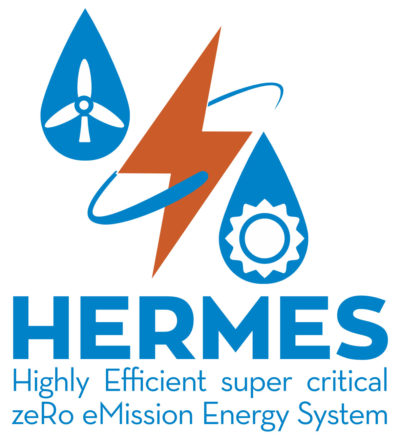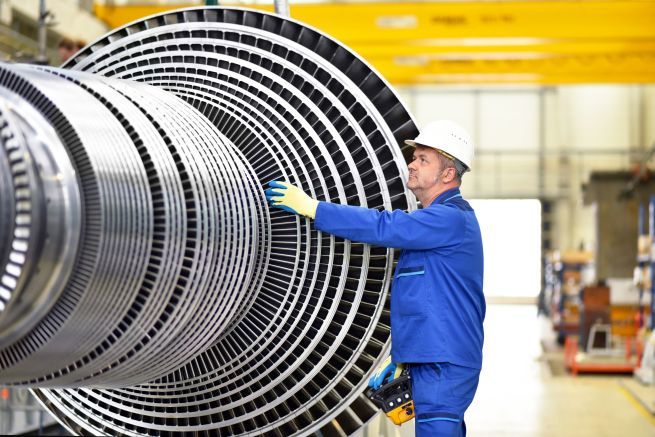EU project HERMES aims for climate-neutral power generation with new generation of gas turbines
01 February 2023 – Climate-neutral, emission-free and highly efficient – this is what the power generation of the future could look like with a new generation of supercritical gas turbine power plants. The prerequisite is that they are operated with storable, renewable energy sources instead of natural gas and in the supercritical range, and that the CO2 required in the process is recycled. Power generation with gas turbines offers significant advantages, such as efficiency, reliability, rapid variability of output to stabilize the power grid, and balancing of demand fluctuations.
To further increase efficiency and eliminate pollutant emissions, the consortium partners in the EU HERMES research project want to take gas turbines to a new technical level. The new technology and operation with CO2-neutral storable energy sources instead of conventional natural gas are also intended to contribute to security of supply and climate protection.
The highly efficient gas turbine power plant envisaged is to be operated in a closed cycle with methanol as a renewable fuel for basic tests in the laboratory. To this end, the researchers are developing a novel, cost-effective process for producing renewable methanol on a small scale. For methanol synthesis, water is first split into its components hydrogen (H2) and oxygen (O2) using electrolysis with renewably generated electricity. The hydrogen is synthesized together with carbon dioxide (CO2) to form methanol. The methanol serves as fuel for the gas turbine, where it is reacted with the pure oxygen from electrolysis and supercritical CO2 (sCO2).
Supercritical CO2 boosts efficiency
This should result in emission-free and very efficient combustion with an efficiency of at least 65%. To put CO2 into a supercritical state, it is subjected to a temperature of 31 °C and a pressure of 73 bar, in which it resembles a liquid more than a gas. The s CO2 ensures that temperatures do not become too high when methanol is burned with pure oxygen instead of ambient air. Methanol as a fuel should be interchangeable with other renewable energy sources such as hydrogen, methane, ethanol, ammonia or dimethyl ether. The researchers also want to investigate xenon as an alternative to sCO2. The research project also includes decentralized carbon capture and storage. The stored CO2 will be used to produce the methanol. In the overall process, both the CO2 and the sCO2 will be cycled so that no additional CO2 is released into the atmosphere. Dynamic simulation tools such as digital twins and machine learning algorithms will help evaluate the system for different scenarios.
Possible applications for the highly efficient gas turbine power plant include energy-intensive industries such as: for the production of cement, steel, ceramics or glass, as well as decentralized power and heat generation for city districts, for example: for large building complexes or critical infrastructures such as hospitals, etc.
OWI and TEC4FUELS investigate fuels and materials
OWI Science for Fuels gGmbH and TEC4FUELS GmbH are involved in HERMES as consortium partners. TEC4FUELS identifies renewable fuels suitable for use in supercritical gas turbine operation and tests their suitability in an application-oriented hardware-in-the-loop test rig in the laboratory. In the test rig, methanol, for example, flows through fuel-carrying components of the gas turbine system under forced conditions for 100 to 200 hours. This provides insights into the compatibility of the fuel with the materials as well as their service life with regard to aging behavior and wear.
OWI Science for Fuels conducts experiments in a pressure cell using the heat-flux method to determine the laminar combustion velocity of different fuels, thus creating basic conditions for the flexible use of different fuels. For a consistently high efficiency of the system, flames in the combustion chamber must be as homogeneous and stable as possible, even when using different fuels with their different energy contents and properties. In parallel, OWI is still investigating the ignition behavior of the gaseous fuels in order to identify optimum turbine starting conditions.
More information at https://hermes-energy.eu/

The EU research project “HERMES” is funded by the European Union within the framework of the research and innovation program HORIZON EUROPE under the grant number 101083748.
The HERMES Consortium
- Universiteit Twente
- Ethnocon Metsovion Polytechnion
- Exergia Energy and Environment Consultants AE
- TEC4FUELS GmbH
- OWI Science for Fuels gGmbH
- Imperial College of Science Technology and Medicine
- CERFACS, Centre Européen der Recherche et de Formation Avancée en Calcul Scientifique
- Paul Scherrer Institut
- OPRA Engineering Solutions B.V.
- Ecole Polytechnique Fédérale de Lausanne
- Politechnika Wroclawska







